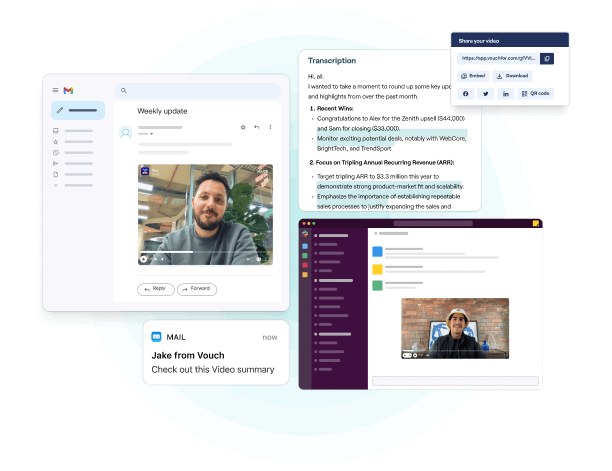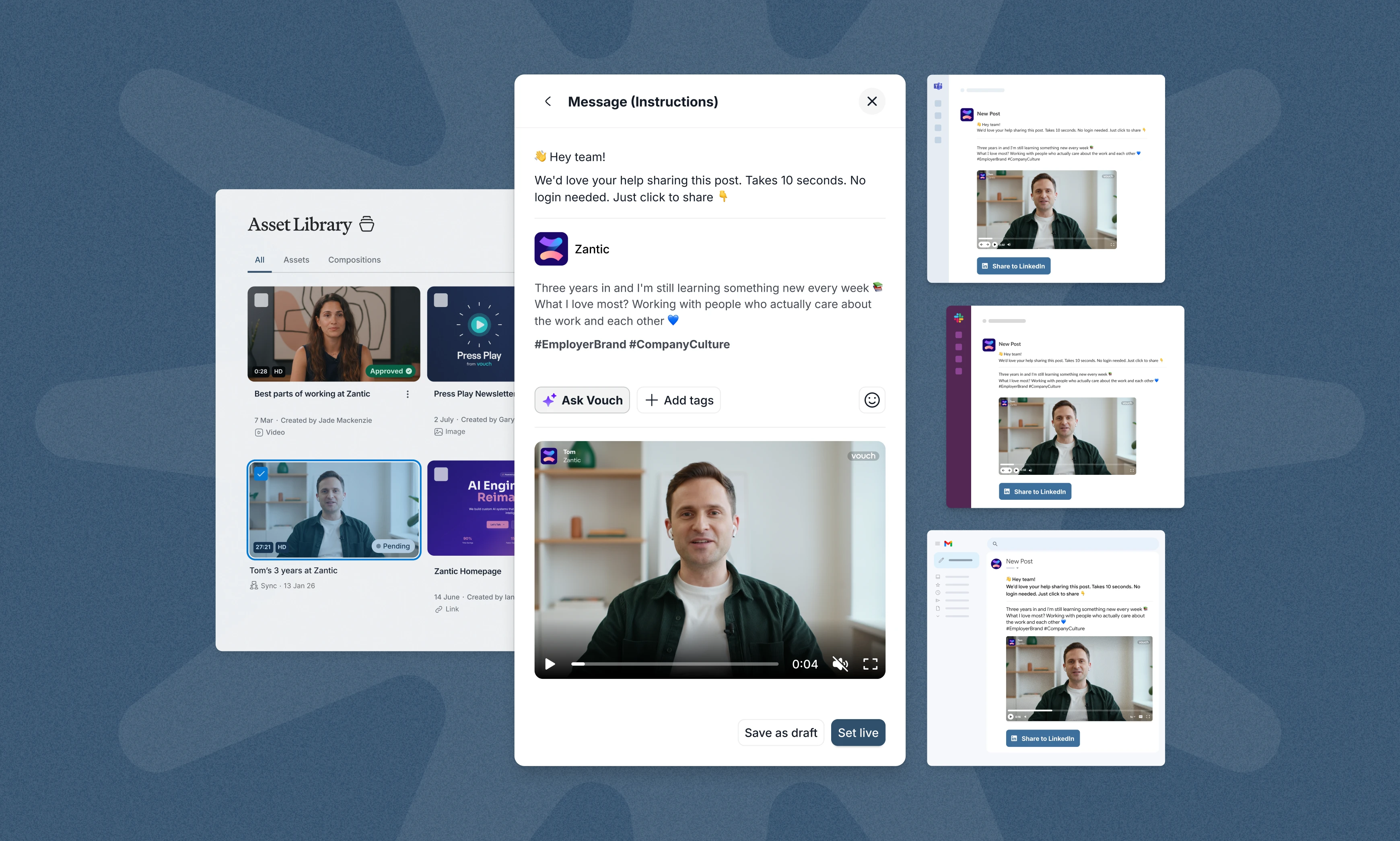Internal communications is a vast field that has a huge impact on all kinds of companies around the world.
Solid internal communication is vital for any business's success - as it is the foundation of building trust, managing change, handling crises, and connecting with your employees to help build your employee brand.
There's a lot to cover and internal comms is a fascinating job, so let's dive in!
So let's get started.
Key Highlights
- An internal communications specialist is responsible for developing and implementing effective internal communication strategies within a company.
- Internal communications specialists bridge the gap between the business and its employees by ensuring clear and consistent communication.
- Key skills required for the role include empathy, listening, leadership, flexibility, and influence.
- Internal communications specialists also need to have strong copywriting skills and business literacy.
- Modern video tools like Vouch are helping internal comms specialists all over the world.
What Does an Internal Communications Specialist Do?
An internal communications specialist develops and implements communication strategies within an organization to ensure effective information flow across all of your departments.
They manage channels like intranets, newsletters, and email updates - they also create content, coordinate departments, and measure your internal communications impact.
Internal communications specialists are also renowned for enhancing employee engagement through initiatives like events and recognition programs and helping to build your company culture into a business people love working for.
Make the impersonal, personal
- Empower leaders with visible updates
- Highlight employee stories effectively
- Clear communication during rapid changes
- Streamline across time zones

Why Is Internal Communications So Important?
The best way to understand the immense impact of internal communications is to look at the statistics.
Here are five statistics with their sources that all relate to internal comms tasks and responsibilities:
- Engagement: According to Gallup, highly engaged teams show a 21% greater profitability.
- Retention: Towers Watson found that companies with effective communication practices enjoy 47% higher total returns to shareholders compared to organizations with poor practices.
- Productivity: A report by McKinsey found that productivity improves by 20-25% in organizations with connected employees.
- Innovation: Deloitte found that organizations with a high degree of employee engagement are 250% more likely to be successful in innovation efforts.
- Culture: A report by ClearCompany revealed that 86% of employees and executives cite a lack of collaboration or ineffective communication as the cause of workplace failures.
What Teams Do Internal Communication Specialists Work In?
Internal communication specialists typically work in the Human Resources (HR) or Corporate Communications departments.
These departments as a whole, are responsible for managing employee communications, company announcements, and internal newsletters. In some cases, such as large corporations, internal communication specialists may also work in dedicated internal communications teams that focus specifically on communicating with employees.
What Are the 7 Skills Required For Internal Communications?
We've touched on the combination of empathy and technical abilities, but let's dive a little deeper into the varied skills an internal communications specialist needs:
- Technical abilities: Proficiency in tools such as intranets, email, video tools, and social media platforms.
- Creative messaging and employee engagement techniques: The ability to create engaging and compelling messages that resonate with employees and drive their engagement. Empathy is key here!
- Business acumen and strategic planning: Internal communications specialists need to understand the business goals and what each department does and needs for its communication strategies.
- Interpersonal skills: Building relationships, interviewing, and collaborating with stakeholders across the entire company is vital to the role.
- Research and analytical skills: The ability to gather and analyze data to measure the effectiveness of internal communications efforts is a must to improve comms effectiveness and build team morale consistently.
- Adaptability: Internal communications is rapidly evolving, especially with new advancements in AI and how people interact with content. Internal comms people need to be early adaptors to stay ahead of employees.
Let's Further Unpack the Role of an Internal Communications Specialist
The role of an internal communications specialist, on the surface, involves developing and implementing effective internal communications.
When you unpack the role more, though, internal communications specialists are great business leaders. They need to possess a combination of soft skills, such as empathy and listening, and hard skills, such as business literacy, across all departments.
Let's unpack the role a little more:
1) Emotional Intelligence Vs. Hard Comms Strategies
In the field of internal communications, there is a balance between emotional communications and strategic planning.
Emotional intelligence plays a crucial role in understanding the needs and feelings of employees. With this understanding, strategic planning ensures that communication efforts are effective and aligned with your company's overall goals.
Emotional intelligence is huge, though, as internal communications focus on building trust and empathy among employees. It involves creating messages that resonate on a deep level, creating a sense of belonging and connection. There is also a strong need for great storytelling, personal anecdotes, and engaging visuals to engage employees and get them to take the actions you want.
A successful internal communications specialist understands the importance of emotional communications and strategic planning. They are able to strike a balance between the two, and a great internal communications specialist can help a company grow its bottom line, working from the inside out!
2) From Memos to Multimedia: The Content Spectrum
The content spectrum in internal communications is massive.
From written messages to engaging videos, organizations now have a variety of options to communicate with their employees. Some key content in an internal comms specialists toolbox include:
- Memos: Traditional memos, print comms, and PDFs with digital signatures are vital in internal comms, especially for official announcements and policy updates where written evidence or approval is required.
- Video: Today, capturing an employee's attention and connecting on an emotional level is everything. Video, with the use of modern tools like Vouch, is perfect for company and team updates, rapidly improving your company culture.
- Newsletters: Newsletters are "push marketing" and are still one of the best platforms for sharing news, updates, and insights with employees. Try adding videos to your newsletters for significantly more engagement!
- Intranets: Intranets serve as a centralized hub for internal communication, providing access to resources, news, and collaboration tools. Note that intranets are passive, so be sure to use video and emails to drive people to your intranet.
- Social media: Social media platforms offer "private channels" that provide opportunities for interactive employee communication. They can be used to share company updates, celebrate achievements, and build your workplace community.
3) Measuring the Results Of Internal Comms
When it comes to any internal communication initiatives, measuring the outcomes is paramount.
Establishing key performance indicators (KPIs) aligned with communication strategies and utilizing analytics tools to track open rates, engagement rates, and content consumption provides valuable insights into optimizing internal comms.
Examining metrics across newsletters and intranet activity and using modern survey tools will all help you gauge your company's communications efficacy. Additionally, surveys and feedback mechanisms offer qualitative data for a comprehensive evaluation.
In internal comms, you usually find a groove that works because the other aspect is "communications consistency." You need to create a strategy where your employees expect updates, and with a great internal comms leader, your employees will eagerly await their weekly updates or news!
4) Hands-On Technical Abilities
An internal communications specialist must possess in-depth technical and software abilities and be able to pick up new tools at will.
Familiarity with intranet platforms and email marketing software is vital. Additionally, the ability to create engaging multimedia content using modern communication tools like Vouch and other digital platforms is essential. Technical proficiency enables specialists to navigate the digital landscape efficiently and deliver messages in innovative ways, enhancing overall communication strategies. In this digital age, mastering technical tools and staying updated on emerging technologies are key components of a successful internal communications specialist.
5) Team Engagement Skills
Creative messaging, empathy, soft skills, and engagement techniques are essential for internal communications specialists to connect effectively with employees.
Some key creative and emotional needs include:
- Soft skills: We can't emphasize this enough. An internal commutation specialist needs to collaborate with not only their internal team but also the entire company. Very few roles in a company (outside of HR) need to do this!
- Storytelling: Using storytelling techniques to convey messages in a compelling and relatable manner is a must.
- Visual communication: Utilizing visual elements such as infographics and videos to enhance the impact of messages.
- Gamification: We haven't touched on this yet, but gamification is becoming increasingly important in internal comms to cut through the noise of a busy workday and drive internal engagement.
- Two-way communication: Internal communication is not a one-way street! You need to encourage employees to provide feedback, share ideas, and participate in discussions, too.
6) Able To Adapt With Technology
We need to make a special note here, as technology like one-way video with tools like Vouch has gained immense popularity in internal communications. They can create vastly more impact and emotional connection among employees.
The rise of one-way video in internal communications is also due to its ability to capture employees' attention and interest. It provides a visual and auditory experience that is more engaging than traditional written messages.
If you have yet to leverage video in your internal comms, be sure to book a Vouch demo today and chat with a video content expert. Our simple video tool is loved by companies like Canva, Nike, Cisco, HubSpot, Amazon, and many more!
7) Able To Guide Your Workplace Culture
Internal communication plays a vital role in shaping your workplace culture.
That's because internal communication specialists are at the heart of driving employee engagement.
With all internal communications, there needs to be a seamless bridge between your employees, HR, and upper management teams. "How" you communicate these messages is vital to how employees view your company and their motivation to help you succeed.
Internal comms experts need be able to promote honest, authentic communications, that can directly influence an entire company and its culture.
Needless to say, internal communications is a big job and one that requires a vast range of skills and experiences.
FAQs
What is the role of an internal communications specialist?
The role of an internal communications specialist is to develop and implement effective internal communication strategies within an organization. They are responsible for ensuring clear and consistent communication between stakeholders and the workforce, driving engagement and alignment.
What skills do you need for internal communication?
Key skills required for internal communication include business acumen, strategic planning, interpersonal skills, technical abilities, and research and analytical skills. These skills enable internal communications specialists to effectively facilitate communication within the organization and drive employee engagement.
What is an internal communications manager?
An internal communications manager is a senior-level professional responsible for overseeing internal communication efforts within an organization. They develop and execute communication strategies, engage with senior leaders, and ensure effective communication across the organization.
How do Communications Specialists collaborate with other teams within a company?
Communications specialists collaborate with various teams within a company by coordinating communication efforts, providing guidance on messaging, and ensuring consistent communication across departments. They work closely with stakeholders to understand their needs and align communication strategies with overall organizational goals.
What are the key responsibilities of an internal communications specialist?
The key responsibilities of an internal communications specialist include:
- Developing and implementing communication strategies.
- Managing internal communication channels.
- Creating engaging content.
- Measuring the impact of communication efforts.
- Driving employee engagement through effective communication initiatives.
How does an internal communications specialist contribute to employee engagement?
Internal communications specialists contribute to employee engagement by creating and executing communication strategies that creates a positive and inclusive corporate culture. They ensure that employees feel valued, informed, and connected to the organization's goals, leading to higher levels of engagement and job satisfaction.
Conclusion
The role of an internal communications specialist is pivotal in shaping effective internal communication strategies and, indeed, your workplace culture.
With a blend of technical abilities, creativeness, and a keen understanding of people and culture, the impact of internal communication on workplace culture cannot be overstated.
Modern tools like Vouch also help internal comms specialists connect and engage with your entire company, which is increasingly important in 2026 and beyond as employees are bombarded with more and more messages each day.
See Why Internal Communications Specialist Love Vouch
Loved by companies like Canva, Nike, Cisco, HubSpot, Amazon, and more, tools like Vouch make leveraging video in your business remarkably easy.
Be sure to book a Vouch demo today and chat with a video content expert.
You might also like

Elevate Your Brand Today With Vouch
Discover how Vouch can accelerate talent acquisition while helping you stay on-brand.






